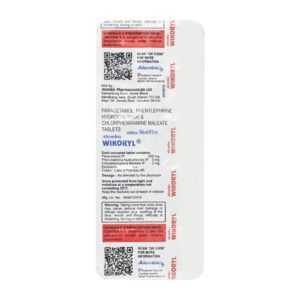PARACETAMOL + CHLORPHENIRAMINE + CAFFEINE
Paracetamol: Paracetamol, also known as acetaminophen, is a commonly used medication for mild to moderate pain relief and reducing fever. It belongs to the class of drugs called analgesics (pain relievers) and antipyretics (fever reducers).
The exact mechanism of action of paracetamol is not fully understood. However, it is thought to work by inhibiting the production of prostaglandins in the brain, which are responsible for pain and fever. It does not have significant anti-inflammatory effects like nonsteroidal anti-inflammatory drugs (NSAIDs), such as ibuprofen or aspirin.
Paracetamol is available over-the-counter and is found in many combination products with other medications, such as cold and flu remedies. It is commonly used for headaches, muscle aches, toothaches, menstrual cramps, and reducing fever.
The typical dose of paracetamol for adults is 500 to 1000 mg every 4 to 6 hours, with a maximum daily dose of 4000 mg. For children, the dose is based on their weight. It is important to follow the recommended dosing instructions and not exceed the maximum daily dose to avoid liver damage.
While paracetamol is generally considered safe when used as directed, it can cause side effects in some individuals. The most common side effects include nausea, vomiting, stomach pain, and kidney problems. In rare cases, paracetamol can cause a severe skin reaction called Stevens-Johnson syndrome or toxic epidermal necrolysis. Overdosing on paracetamol can lead to severe liver damage or even liver failure.
People with liver disease, alcoholism, or a history of liver problems should use paracetamol with caution and consult their healthcare provider before taking it. It is important to read the label and check for any potential drug interactions if taking other medications in combination with paracetamol.
Chlorpheniramine: Chlorpheniramine is an antihistamine drug that is used to relieve symptoms of allergic conditions such as hay fever, hives, and other respiratory allergies. It can also be used to treat symptoms of the common cold and to relieve itching caused by insect bites or certain skin conditions.
The main mechanism of action of chlorpheniramine is to block the effect of histamine, a chemical produced by the body during an allergic reaction. By blocking histamine receptors, it reduces the symptoms associated with allergies, such as runny nose, sneezing, itching, and watery eyes.
Chlorpheniramine is available in various forms, including tablets, capsules, syrups, and nasal sprays. The recommended dose varies depending on the age and weight of the individual, as well as the formulation of the drug. It is important to follow the instructions provided by the healthcare professional or the dosage instructions on the packaging.
Like any medication, chlorpheniramine may cause side effects. Common side effects may include drowsiness, dry mouth, blurred vision, constipation, and urinary retention. These side effects tend to be mild and may go away as the body adjusts to the medication. However, individuals who experience severe side effects or an allergic reaction (such as rash, itching, swelling, dizziness, or difficulty breathing) should seek immediate medical attention.
It should be noted that chlorpheniramine can have sedative effects and may impair mental and physical abilities, so it is important to avoid activities that require alertness, such as driving or operating machinery, until the individual knows how the medication affects them.
As with any medication, it is advisable to consult with a healthcare professional before starting chlorpheniramine, especially if you have any underlying medical conditions or are taking other medications that may interact with it.
Caffeine: Caffeine is a stimulant drug that is commonly found in beverages like coffee, tea, and energy drinks. It is also sometimes used in over-the-counter medications and supplements.
The primary use of caffeine is to increase alertness and combat feelings of fatigue. It stimulates the central nervous system, promoting wakefulness and reducing the perception of tiredness. This is why many people consume caffeine in the morning or during times when they need to stay awake and attentive.
Caffeine works by blocking adenosine receptors in the brain. Adenosine is a neurotransmitter that promotes relaxation and sleepiness. By inhibiting adenosine, caffeine enhances the release of other neurotransmitters like dopamine and norepinephrine, which can increase arousal and focus.
The typical dose of caffeine depends on the individual’s tolerance, but a moderate dose is considered to be around 200-400mg per day. This is roughly equivalent to one to two cups of coffee. It is important to note that individual sensitivity to caffeine varies, and higher doses can lead to side effects.
Common side effects of caffeine include restlessness, increased heart rate, increased blood pressure, and difficulty sleeping. Some individuals may also experience jitteriness, anxiety, or upset stomach. Prolonged and excessive use of caffeine can lead to dependence, withdrawal symptoms (such as headaches and irritability), and interfere with normal sleep patterns.
Due to its stimulating effects, caffeine should be used with caution in individuals with certain health conditions, such as high blood pressure, heart problems, anxiety disorders, or sleep disorders. Pregnant women and those who are breastfeeding are also advised to limit their caffeine intake.
It is important to note that caffeine is a drug and should be consumed responsibly. It is always recommended to consult with a healthcare professional before using caffeine or any other substance for therapeutic purposes or as a supplement. They can provide personalized advice based on individual health factors and requirements.

